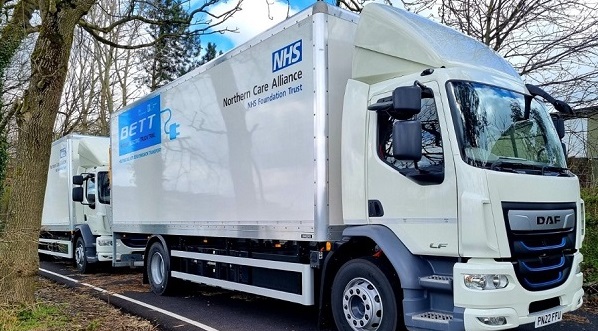Electric vehicles drive down carbon emissions in and around Greater Manchester
The issue
Outdoor air pollution is responsible for between 28,000 and 36,000 deaths in the UK every year.
It causes one in ten cases of lung cancer and can both lead to and worsen a range of health problems, including deteriorating lung function, exacerbating asthma, and increasing incidence of – and hospital admissions for – respiratory and cardiovascular diseases.
Contributing around 4% of UK carbon emissions, the NHS has an essential role to play in tackling climate change at source to protect the health of our communities now and in the future.
Recognising they are often emitted from the same source, cutting carbon emissions will also significantly reduce the NHS contribution to air pollution, which is notably poorer in some areas across Greater Manchester.
The solution
The Northern Care Alliance, which runs local hospitals and services across Oldham, Bury, Rochdale, and Salford, is the first NHS organisation to trial the first fully electric heavy goods vehicle (HGV) for its services.
Local communities in these areas look set to benefit from improved air quality and reduced carbon emissions in and around local hospital sites, as the trust – one of the country’s largest – has begun to use two fully electric HGVs to deliver laundry and other essential supplies and equipment.
The state-of-the-art DAF LF electric 19-tonne HGV vehicles are fitted with data logging equipment to help gather essential information to discover and inform the best use for the new transport solution, ensuring it matches the organisation’s service needs while contributing to its aims to achieve net zero by 2040.
The trial will also pilot some of the first technology to help to shape the use of battery electric vehicles in commercial transport, paving the way for more greener vehicles across the country in future.
Dr Owen Williams OBE, Chief Executive of the Northern Care Alliance NHS Foundation Trust, said: “We’re incredibly excited to be part of this pilot to try new things and discover what these technologies can do for us, as well as move us away from high levels of emissions being brought through our sites and neighbouring communities every day, towards a much cleaner, greener solution that will benefit not only our patients but our staff, visitors and local communities too.
“It’s not just the environmental impact that matters, these plans, technologies and trials work to deliver improved patient care, save lives, improve lives, and reduce costs and waste.”
The impact
The two fully electric HGVs produce zero nitrogen dioxide. This compares with fleet vehicles which produce an estimated 557mg of nitrous oxide per kilometre.
Elevated levels of nitrogen oxides can cause damage to people’s respiratory tracts and increase their vulnerability to developing or worsening respiratory infections and asthma. It’s estimated the two vehicles at Northern Care Alliance could save 834,386mg (834 grams) of nitrous oxide emissions every week.
What’s next
Earlier this year, the Trust also purchased the first EV non-emergency ambulance for their fleet, having trialled a few in 2021. The fully electric vehicle is believed to be the cleanest, greenest and most energy-efficient in the NHS.
A recent pilot with Trailar, a local solar technology supplier, has also seen six of the trust’s existing 7.5 tonne vehicles fitted with specialist technology helping to reduce fuel consumption and create electrical energy to power onboard equipment: the solar technology means that the vehicle no longer needs to idle its engine when making deliveries to power the tail-lift
Dr Nick Watts, Chief Sustainability Officer of NHS England and Improvement said: “The climate emergency is a health emergency, and this is an important step forward in meeting the NHS commitment to reach net zero by 2040. The new fully electric HGV, along with the Alliance’s other innovative strategies to reduce emissions from its transport, and its overarching green plan, will mean cleaner air and greater wellbeing for its communities and patients”.
The NHS is in the process of introducing 13 new HGVs in total across the country as part of a trial funded by UK Government.
Further information can be on the Northern Care Alliance NHS Foundation Trust website.
Contact: Craig Wilson, Group Head of Sustainability, Northern Care Alliance NHS Foundation Trust craig.wilson@nca.nhs.uk

